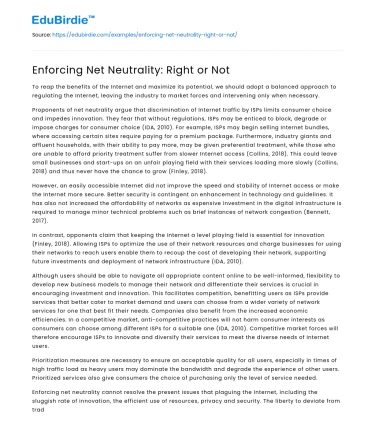To reap the benefits of the Internet and maximize its potential, we should adopt a balanced approach to regulating the Internet, leaving the industry to market forces and intervening only when necessary.
Proponents of net neutrality argue that discrimination of Internet traffic by ISPs limits consumer choice and impedes innovation. They fear that without regulations, ISPs may be enticed to block, degrade or impose charges for consumer choice (IDA, 2010). For example, ISPs may begin selling Internet bundles, where accessing certain sites require paying for a premium package. Furthermore, industry giants and affluent households, with their ability to pay more, may be given preferential treatment, while those who are unable to afford priority treatment suffer from slower Internet access (Collins, 2018). This could leave small businesses and start-ups on an unfair playing field with their services loading more slowly (Collins, 2018) and thus never have the chance to grow (Finley, 2018).
Save your time!
We can take care of your essay
- Proper editing and formatting
- Free revision, title page, and bibliography
- Flexible prices and money-back guarantee
However, an easily accessible Internet did not improve the speed and stability of Internet access or make the Internet more secure. Better security is contingent on enhancement in technology and guidelines. It has also not increased the affordability of networks as expensive investment in the digital infrastructure is required to manage minor technical problems such as brief instances of network congestion (Bennett, 2017).
In contrast, opponents claim that keeping the Internet a level playing field is essential for innovation (Finley, 2018). Allowing ISPs to optimize the use of their network resources and charge businesses for using their networks to reach users enable them to recoup the cost of developing their network, supporting future investments and deployment of network infrastructure (IDA, 2010).
Although users should be able to navigate all appropriate content online to be well-informed, flexibility to develop new business models to manage their network and differentiate their services is crucial in encouraging investment and innovation. This facilitates competition, benefitting users as ISPs provide services that better cater to market demand and users can choose from a wider variety of network services for one that best fit their needs. Companies also benefit from the increased economic efficiencies. In a competitive market, anti-competitive practices will not harm consumer interests as consumers can choose among different ISPs for a suitable one (IDA, 2010). Competitive market forces will therefore encourage ISPs to innovate and diversify their services to meet the diverse needs of Internet users.
Prioritization measures are necessary to ensure an acceptable quality for all users, especially in times of high traffic load as heavy users may dominate the bandwidth and degrade the experience of other users. Prioritized services also give consumers the choice of purchasing only the level of service needed.
Enforcing net neutrality cannot resolve the present issues that plaguing the Internet, including the sluggish rate of innovation, the efficient use of resources, privacy and security. The liberty to deviate from tradition helps developers improve the network (Bennett, 2017). Hence, for the sector to flourish, net neutrality should largely be left to market forces with some regulation to protect consumer and corporate interests.






 Stuck on your essay?
Stuck on your essay?

